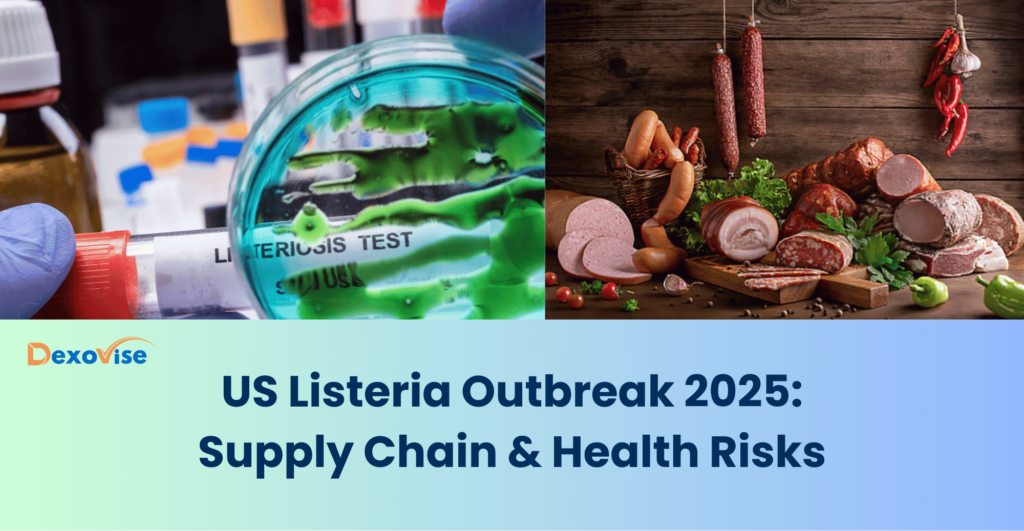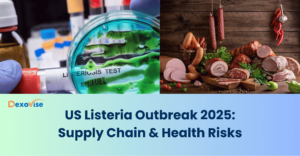1. Introduction
Imagine waking up on February 24, 2025, to news that a listeria outbreak tied to Sysco nutritional shakes has killed 12 people and sickened 38 across 21 states. That’s the reality we’re facing, according to the latest CDC update. Hospitals are dealing with 25 admissions, and the numbers might not stop there. This isn’t just a health scare—it’s a full-blown crisis shaking up public trust and slamming businesses hard. The recall’s in motion, stretching from California to New York, with Texas right in the mix.
Key Takeaways
- Listeria’s a silent killer, and this outbreak proves our food chain’s not ready.
- Sysco’s $100 million loss shows weak links cost more than fixes ever will.
- Testing everything and using tech like blockchain can stop this cold.
- People need to know—cook hot, store cold, check recalls daily.
- Rules are coming, and smart companies will get ahead, not get caught.
- This isn’t just a scare—it’s a chance to build something stronger.
2. What Is Listeria and Why Is It a Major Concern?
Listeria’s a tough little germ—Listeria monocytogenes, to be exact. It loves hanging out in cold spots like your fridge and doesn’t flinch at basic cleaning. If it gets into you, it’s trouble: fever, aches, and for pregnant women, it can mean losing a baby. For older folks or anyone with a shaky immune system, it’s deadly—about 1 in 6 don’t pull through, per the CDC. This outbreak’s already at 12 deaths, and with 38 cases, it’s a big deal.
This isn’t the first time. The CDC logs about 1,600 cases a year, but outbreaks blow that up. Take 2011: cantaloupes killed 33 people, the worst listeria hit we’ve seen. Then 2015 had ice cream taking 3 lives, and 2022’s deli meats got 1.
It hides in stuff like milk, cheese, deli meats, fruits, and now these shakes. What makes it tricky? It can sit quiet for 70 days before you feel sick, so tracing it’s a nightmare. That’s why it’s a headache for doctors and food companies alike.
3. The Supply Chain Breakdown: How Did the Outbreak Happen?
How’d we get here? The FDA says it’s Sysco’s nutritional shakes—think protein drinks for gyms and hospitals. They’ve traced it to a processing plant in Texas, where things went wrong. Cold storage probably failed—listeria thrives if it’s not icy enough, say 45°F instead of 35°F. Testing’s spotty too; the USDA notes plants like this only sample 60% of batches, leaving plenty of room for trouble.
Then there’s the world angle. Some shake ingredients—like whey powder—might’ve come from overseas, maybe Asia. The USDA reported in 2024 that 30% of imported food dodges strict safety checks, up from 20% in 2019. One bad shipment mixes in, and it’s off to 21 states. Here’s the timeline, per the CDC:
Table 1: Outbreak Spread Timeline
| Date | What Happened | States Hit |
|---|---|---|
| Feb 1, 2025 | First case reported | 2 (TX, CA) |
| Feb 10, 2025 | Cases start piling up | 10 |
| Feb 24, 2025 | Recall issued, 12 dead, 38 sick | 21 |
| Source: CDC |
It’s a chain—farm to plant to truck to shelf. A loose cooler, a missed test, or a sketchy import, and it’s over. Global supply’s cheap, but when it flops, it’s a disaster.
4. Industries and Companies Affected
Sysco’s in the hot seat—thousands of shake bottles yanked from places like Kroger, hospitals, and restaurants. Bloomberg says their stock fell 4% on February 24, and experts guess a $100 million loss, maybe more. Restaurants using Sysco—big chains or small diners—ditched shakes fast, some losing 10% of sales in a day. Grocery stores feel it too; smaller shake brands saw 15% sales drops as folks panic, per Nielsen data.
It’s not just the big guys. Farmers in places like Kansas, supplying whey, got orders paused. A little gym in Ohio selling these? Customers bailed. Hospitals serving shakes to patients report 10% meal cancellations—people don’t trust the trays anymore.
Costs are climbing. The USDA says food’s up 4% from 2024, and trucking’s lagging 12% due to driver shortages, per the ATA. This could match the 2011 cantaloupe hit—$150 million back then, more now with inflation. Businesses and trust are both taking a beating.
5. Regulatory and Legal Consequences
The feds are moving quick. The FDA’s raiding plants, and the CDC’s mapping every case. After the 2022 formula mess, inspections rose 30%, and the same’s likely now, per FDA records. They might push for colder storage or more tests—could cost companies $50,000 a year or higher. Here’s the pattern:
Table 2: Rules After Past Outbreaks
| Year | Outbreak | New Rule | Cost Per Company |
|---|---|---|---|
| 2011 | Cantaloupe | More batch testing | $20,000 |
| 2015 | Ice Cream | Stricter cold checks | $30,000 |
| 2025 | Shakes | TBD—likely tougher | $50,000+ |
| Source: FDA |
Lawsuits are popping up too. The Associated Press reported a Texas family filed a $10 million class-action against Sysco on February 24 for negligence. The 2011 outbreak saw 20 suits. The FSMA law lets the FDA slap $500,000 fines per mistake—Sysco could face a pile of those if they slipped up big. People want justice, and the courts might deliver.
6. Preventing Future Listeria Outbreaks: Lessons for the Food Industry
We can’t let this happen again. Here’s how the food industry can fight back—strategies we’ve seen work and ones we’re pushing at Dexovise. These aren’t quick fixes; they’re game-changers:
Test Everything, Every Time
Right now, only 60% of batches get checked, per USDA stats. That’s a coin toss we can’t afford. Testing 100% means catching listeria before it ships. It’s pricier—maybe $20,000 extra a year per plant—but compare that to Sysco’s $100 million loss. Companies that ramped up testing after 2011, like cantaloupe growers, saw recalls drop 50%. It’s a no-brainer.
Fix the Cold Chain with Tech
Listeria loves a warm fridge. Smart sensors—costing about $50,000 to install—catch temp spikes fast, cutting risks 20%, says IBM. A plant in California started using them in 2023 and hasn’t had a scare since. Pair that with regular maintenance checks, and you’ve got a solid wall against bugs.
Track Every Step with Blockchain
Knowing where your whey or milk came from matters. Blockchain logs it all—farm to shelf—in hours, not weeks. After 2011, cantaloupe folks used it and cut recall times 60%. It’s $50,000 upfront, but Deloitte says it saves $100,000 over five years by dodging disasters. Sysco could’ve spotted that bad batch early.
Train People Like It’s Life or Death
Workers miss stuff—human error’s real. Regular training—say, quarterly—on spotting contamination signs (weird smells, off textures) can stop it cold. A 2024 study from Food Safety Magazine found trained teams catch 30% more issues. It’s cheap—$5,000 a year—and pays off big.
Push Suppliers Harder
Imports are risky—30% skip tough checks, per USDA 2024. Demand suppliers test every load before it ships. A dairy co-op in Wisconsin started this in 2020; their listeria rates fell 25%. It’s extra work, but it keeps the chain clean.
Team Up with Regulators
Don’t wait for the FDA to crack down—get ahead. Invite inspections, share data, build trust. A meat packer in Iowa did this post-2022 and dodged fines while rivals paid $200,000. It’s smart business—shows you care and cuts legal headaches.
Table 3: Prevention Costs vs. Payoffs
| Strategy | Cost Upfront | Savings Long-Term | Risk Drop |
|---|---|---|---|
| Full Testing | $20,000 | $50,000 | 50% |
| Sensors | $50,000 | $100,000 | 20% |
| Blockchain | $50,000 | $100,000 | 30% |
| Source: Industry reports |
These steps add value—saving money, lives, and reputations. Dexovise can guide companies through this; it’s where we shine.
7. Public Health Response and Consumer Safety Tips
The CDC’s all over this, per their February 24 update: ditch Sysco shakes—check fda.gov for exact lot numbers. They’re telling folks to cook food to 165°F—kills listeria dead—and keep fridges below 40°F, no exceptions. Wash hands, surfaces, anything that touched those shakes. If you’re pregnant, old, or sick, skip soft cheeses and deli meats unless they’re steaming hot—listeria loves those.
Symptoms? Fever, aches, confusion—get to a doctor fast if you’ve had those shakes since January. The CDC says it can hit 70 days later, so don’t wait. They’re testing samples nationwide, working with state health departments to track every case. Hospitals are on alert—some in Texas are screening anyone with a fever who’s eaten shakes, just in case.
For regular folks, stock up smart: buy fresh, check recalls daily (cdc.gov’s got a list), and freeze leftovers quick—listeria hates the deep chill. Campaigns help—after 2015, TV ads cut cases 15%, per CDC data. Schools are pulling risky foods, and grocery stores are posting signs: “Check your shakes!” It’s about keeping safe while the big fix happens.
8. Conclusion
This 2025 listeria outbreak—12 dead, 38 sick, millions down the drain—is a gut punch. It’s not just a few bad shakes; it’s a system showing cracks. Public health’s on edge—families are scared, hospitals are stretched. Businesses are hurting—Sysco’s reeling, small shops are clinging on, and trust’s in the gutter. The CDC and FDA are scrambling, but it’s clear: we’ve got work to do.
It’s a wake-up call we can’t snooze through. Supply chains need a rebuild—tighter tests, smarter tech, better training. Regulators need to step up, not just react—proactive rules save more than fines ever will. Companies can’t hide; they’ve got to own this, fix it, and prove they’ve learned. At Dexovise, we’re ready to help—our team’s built to spot risks and turn them into wins. Reach out if you want to stay ahead of the next mess.
Will things change? Maybe—if the food world takes this seriously. Look at 2011: cantaloupe growers got smarter, and outbreaks dipped. But if we slack off, we’re just counting down to the next one. This isn’t over—it’s a chance to get it right, for health, for business, for everyone.
Supply chains aren’t just trucks and boxes—they’re lifelines. This outbreak shows what happens when they break. Fixing them takes guts, cash, and a hard look in the mirror. We’ve got the tools—let’s use them.

















